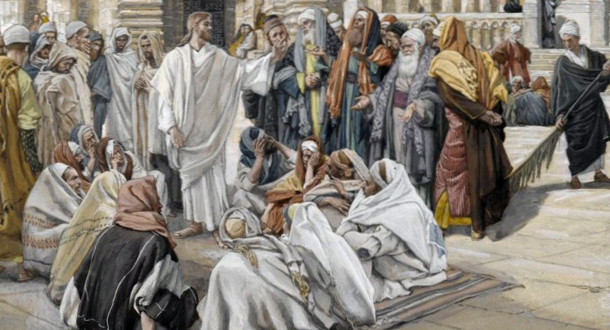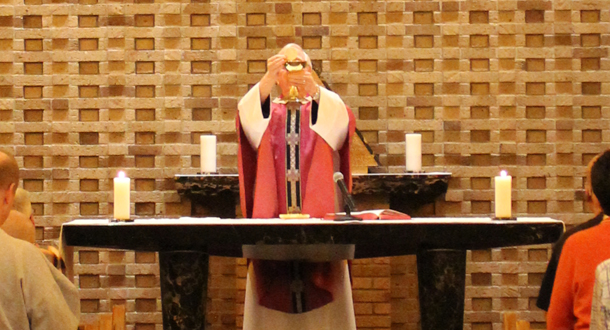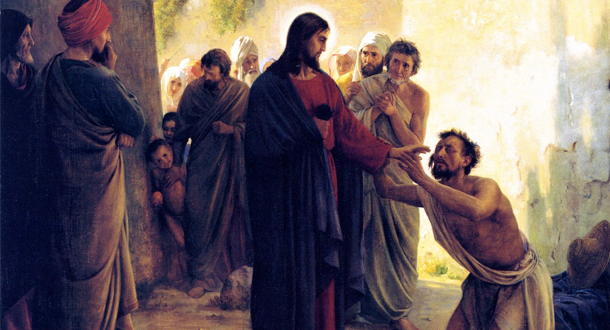
Scripture:
2 Timothy 1:1-3, 6-12
Mark 12:18-27
Reflection:
In reading the four Gospels, it’s not uncommon to find people in the story who are confused by Jesus’s teaching and what he stands for. Over the last couple of weeks, the Gospel readings reveal Jesus as a teacher, speaking about the ways of the Kingdom of God, while the people of the stories are trying to interpret him from the ways of the world. This, of course, leads to misunderstandings. And we all know from human experience how our tendency is to dig in our heels to prove that we are right. Have you noticed how many times in scripture people come to Jesus to test him?
Today, for example, we have the Sadducees approaching Jesus with an absurd and ludicrous scenario. It is the story of a woman whose husband dies after she gets married. Thus begins a succession of marrying the next sequential brother in the family after each of the husbands die. The idea that this could actually happen in real life is highly unlikely. But the real argument is not about the question they throw at Jesus which is whose wife will she be? The real issue is that the Sadducees are standing before Jesus holding firm to their belief that there is no resurrection, going so far as to mock anyone who does believe in resurrection. There is an intense inability of the Sadducees to see anything beyond their personal belief. How is this any different than the polarized world we live in two millenniums later? The desire to hold so firmly to one’s personal belief, to even wish harm upon others whose opinions and beliefs are contrary to one’s own, is a daily reality for us.
Just a few months ago, a woman on retreat said to me, “I can’t talk with people anymore about anything. We can’t talk about current events. We definitely can’t talk about anything political. I can’t even mention the atrocities of war that are taking place. Religious ideas are certainly out of the question. And with some people, I can’t even talk about the weather because it brings up global warming! It just seems so unsocial and unhuman.”
Remember, the Sadducees come to Jesus to put him to the test. They are overconfident and blind to how they are misinformed. Jesus throws them a zinger. He calls them “greatly misled because they do not know the scriptures or the power of God”. Saying that to upper echelon religious leaders had to sting! We are not told how the Sadducees hear Jesus’ words or how they respond. I personally can’t believe that was the end of the dialogue because humanity, as I know it, in this level of confrontation, frequently chooses to respond with more aggression.
Lastly, I want to highlight a gospel story from last week. It is the story of Bartimaeus, the blind man who, in desperation, was calling out to Jesus as Jesus walked up the road toward Jerusalem. Bartimaeus wanted the gift of site. He knew he was blind, and he wanted the ability to see. I have been pondering how we recognize our own blindness. Does human pride block the possibility that we may actually hold some ignorance? Perhaps there is an element of superiority? Dietrich Bonhoeffer, a German pastor, and theologian who was executed in 1945 in Nazi Germany, suggested that this kind of blindness is more of a sociological problem than a psychological problem. It frequently begins in groups of like-minded people. And they can bond together in such a way that identity with the group supersedes the need for greater understanding or finding truth. Bartimaeus approaches Jesus not from a place of comfort, or strength. He defies the voices of the populace, the group surrounding Jesus. He approaches Jesus from his deficiency and his vulnerability. Having thrown his cloak aside, he boldly states, Master, I want to see”.
Jesus’ answer back to the Sadducees is that you are not what you claim to be. What challenging words these are for us as we live in such challenging times.
Fr. David Colhour, C.P. is the Provincial Superior of Holy Cross Province. He resides in Chicago, Illinois.







